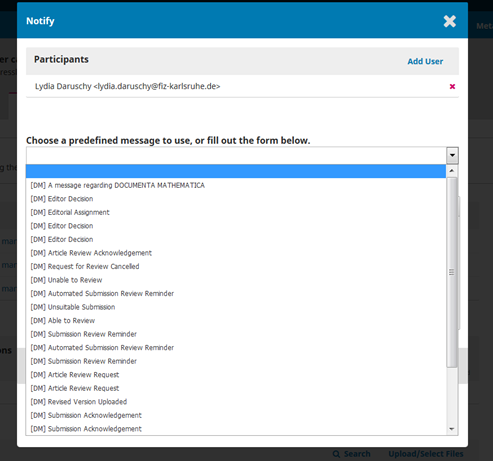Hello,
we are in production with version 3.0.2 and testing version 3.1.0.0. In both versions when trying to notify a participant you get a template to “chose” a predefined message. There is a pick list with subjects to chose from. After some time of working with this feature, we see that the subjects start to show up several times in the list so that the list gets longer and longer. Does anybody know how to prevent this? Here is a screenshot to demonstrate:

Beside this question our participants often wonder (and ask) that when it says “chose a predefined message” that this only means a subject, but the text field is always empty.
Thanks for any help or hint
Sabrina Eck
Hi @sabrinaeck,
I haven’t been able to reproduce this myself –
Can you check in your database (e.g. using a tool like phpMyAdmin) whether there are indeed duplicates for these templates in the email_templates_data, email_templates_default_data, email_templates, or email_templates_default tables?
Regards,
Alec Smecher
Public Knowledge Project Team
Hi @asmecher,
we tried to look a bit behind the scenes … and realized that this is not a multiplication in the course of editing (as we supposed at first) , but the multiple identical subjects are there from the start. The reason for this seems to be that all the subjects available in the system are listed there. For example the subject “Editor Decision” in the system is connected with the templates for “Editor Decision Resubmit”, “Editor Decision Decline”, “Editor Decision Accept” and " Editor Decision Revisions". And if all are enabled, then the subject is displayed here four times. That confuses our user, since no standard text included, just a free text field behind all of them.
Thanks for looking into this
Regards
Sabrina
Hi @sabrinaeck,
Ah, I see. Our intention with those templates was to have the editor go into the Prepared Emails area of setup and customize the language – we opted not to provide boiler-plate text for those messages, as they’re such sensitive communications and really deserve some attention.
Regards,
Alec Smecher
Public Knowledge Project Team
